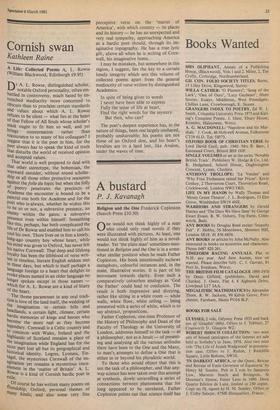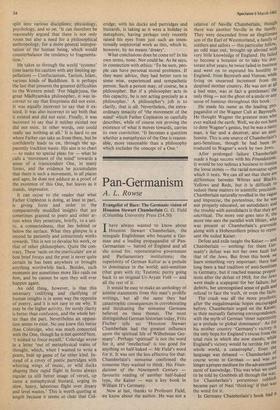A bustard
P. J. Kavanagh Religion and the One Frederick Copleston (Search Press £10.50) Religion and the One Frederick Copleston (Search Press £10.50) One would not think highly of a man who could only read novels if they were illustrated with pictures. At least, one would not think highly of him as a novel- reader. Yet 'the plain man' sometimes men- tioned in Religion and the One is in a some- what similar position when he reads Father Copleston. His book intentionally eschews metaphors, colourful instances and, in the main, illustrative stories. It is part of his movement towards clarity. Even such a comparatively colourless analogy as 'God the Father' could lead to confusion. The result is both impressive and dizzying, rather like sitting in a white room — white walls, white floor, white ceiling — being presented with a series of white, which is to say abstract, propositions.
Father Copleston, one-time Professor of the History of Philosophy and Dean of the Faculty of Theology at the University of London, addresses himself to the task — as a philosopher, not as a Jesuit — of present- ing and analysing all the various attitudes there have been to the One and the Many, to man's, attempts to define a One that is either in or beyond his pluralistic world.
To those who would object that this is not the task of a philosopher, and that any- way science has now taken over this attempt at synthesis, slowly unravelling a series of connections between phenomena that for long appeared to be unrelated, Father Copleston points out that science itself has split into various disciplines; physiology, psychology, and so on. 'It can therefore be reasonably argued that there is not only room but also a need for a philosophical anthropology, for a more general interpre- tation of the human being, which would counterbalance the tendency to fragmenta- tion.'
He takes us through the world 'systems' (one learns his caution with any limiting ap- pellation) — Confucianism, Taoism, Islam, various kinds of Buddhism. It is perhaps the last that presents the greatest difficulties to the Western mind: 'For Nagarjuna, the great Madhyamika philosopher, it was in- correct to say that Emptiness did not exist. It was equally incorrect to say that it ex- isted. It was also incorrect to say both that it existed and did not exist. Finally, it was incorrect to say that it neither existed nor did not exist. In other words, one could really say nothing at all.' It is hard to see where Father can take us from there, but he confidently leads us on, through the ap- parently trackless waste. His aim is to chart — to make no special pleas for — what he calls a `movement of the mind' towards a sense of a transcendent One, in many forms, and the evidence he accumulates that there is such a movement, in all places and ages, he does not adduce as a proof of the existence of this One, but leaves as it stands, impressive.
It can occur to the reader that what Father Copleston is doing, at least in part, is giving form and order to the comparatively muddled insights that are sometimes granted to poets and other ar- tists when they penetrate, briefly, to a uni- ty, a connectedness, that lies behind or below the surface. What they glimpse in a second he patiently and colourlessly works towards. This is not to devalue his work, or that of other philosophers. Quite the con- trary. These 'raids on the inarticulate' are at best brief forays and the poet is never quite certain he has been anywhere or brought anything worthwhile back. Besides, such moments are sometimes more like raids on him, and he cannot be sure they will ever happen again.
An odd thing, however, is that this necessary codifying and clarifying of human insights is in some way the opposite of poetry, and it is not easy to see why. It may be the higher activity, for surely clarity is better than confusion, and the whole bet- ter than the part. Nevertheless an opposi- tion seems to exist. No one knew this better than Coleridge, who was much concerned with the One, though he is not quoted here. `I wished to force myself,' Coleridge wrote in a letter 'out of metaphysical trains of thought, which, when I wanted to write a poem, beat up game of far other kind. In- stead of a covey of poetic partridges with whirring wings of music, or wild ducks shaping their rapid flight in forms always regular (a still better image of verse), up came a metaphysical bustard, urging its slow, heavy, laborious flight over dreary and level wastes.' This is worth quoting at length because it seems so clear that Col-
eridge, with his ducks and partridges and bustards, is taking as it were a holiday in metaphors, having perhaps only recently raised his eyes from just such an inten- tionally unpictorial work as this, which is, however, by no means 'dreary'.
What conclusions does he come to? In his own terms, none. Nor could he. As he says, in connection with ethics: `To be sure, peo- ple can have personal moral problems. If they want advice, they had better turn to some wise, experienced and sympathetic person. Such a person may, of course, be a philosopher. But if a philosopher acts in this capacity, he is not acting precisely as a philosopher.' A philosopher's job is to clarify, that is all. Nevertheless, the extra- ordinary tenacity of 'the movement of the mind' which Father Copleston so carefully describes, while of course not proving the existence of what it moves towards, carries its own conviction. 'It becomes a question whether a metaphysics of the One is reason- able, more reasonable than a philosophy which excludes the concept of a One.'







































 Previous page
Previous page